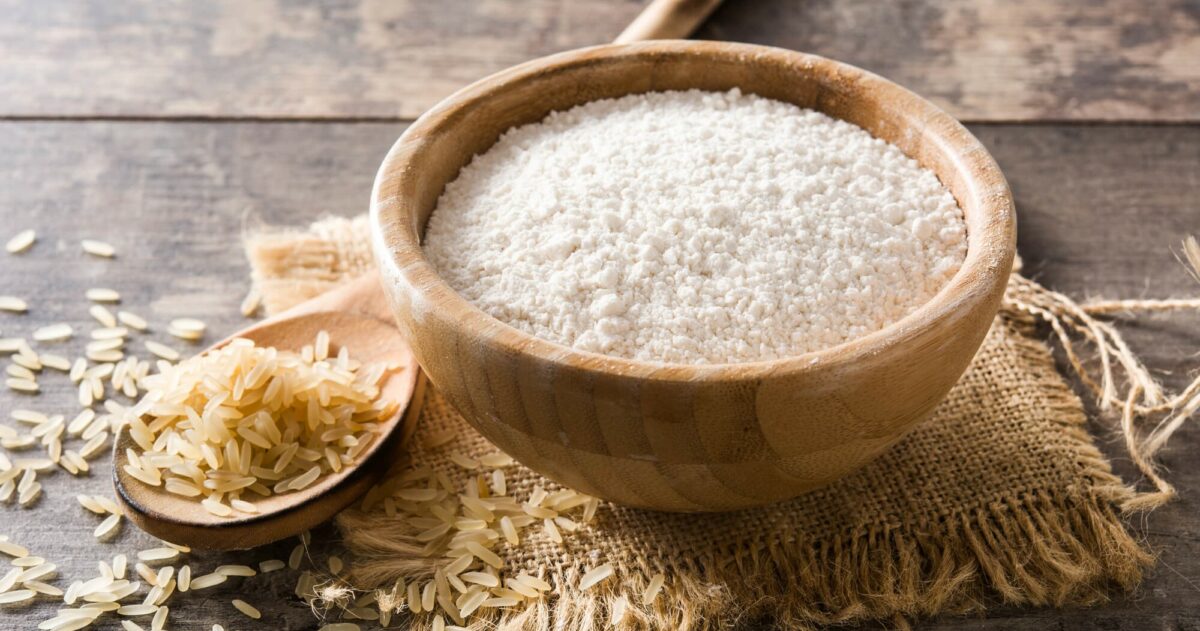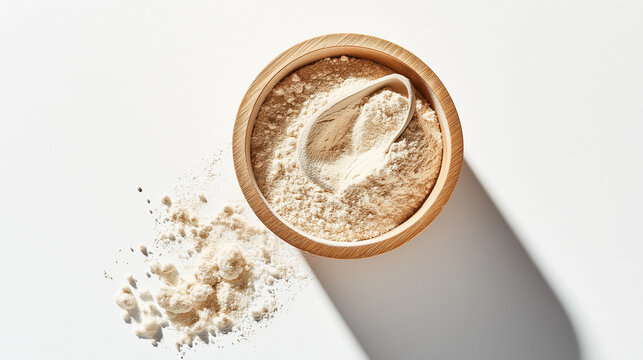Boost Your Nutrition with Organic Rice Protein Powder – Here’s Why
In recent years, plant-based proteins have surged in popularity, with people turning to more sustainable, clean, and allergen-friendly options. One standout choice is Organic Rice Protein Powder — a potent yet gentle source of protein that’s naturally packed with health benefits. Here’s why organic rice protein deserves a place in your wellness routine.
What is Organic Rice Protein Powder?
Organic Rice Protein Powder is a plant-based protein supplement derived from organic brown rice. It is a popular alternative to animal-based protein powders and is well-suited for individuals following vegetarian, vegan, gluten-free, or plant-based diets. The brown rice used in YANGGEBIOTECH organic Rice Protein Powder is non-genetically modified, ensuring that the product aligns with non-GMO principles. organic rice protein powder is commonly used by athletes and fitness enthusiasts as a post-workout or recovery supplement to support muscle repair and growth.

Rice Protein Powder Benefits Everyone Should Know
1. Pure Plant-Based Power: Organic rice protein powder is derived from whole-grain, non-GMO rice, typically brown rice, which is known for its rich nutritional profile. It’s a clean, vegan-friendly source of protein, free from common allergens like
dairy, soy, and gluten, making it ideal for individuals with dietary restrictions or sensitivities.
2. Balanced Amino Acid Profile: One of the primary reasons people reach for rice protein is its balanced amino acid profile. Rice protein contains all essential amino acids, including high levels of cysteine and methionine, often missing in other plant-based proteins. While it’s slightly lower in lysine, pairing it with other plant proteins, like
pea protein, can create a complete amino acid profile.
3. Boosted Muscle Recovery and Growth: For fitness enthusiasts, rice protein powder offers powerful benefits comparable to whey protein. Studies show that it aids muscle repair and growth by providing the essential building blocks our muscles need to recover and become stronger. And because it’s easily digestible, it’s gentle on the stomach, helping to minimize bloating or discomfort that some people experience with other protein sources.
4. High Digestibility and Low Allergenic Potential: Unlike many animal-based proteins, rice protein is hypoallergenic and has a high digestibility score. This means your body can break it down and absorb it efficiently, maximizing nutrient intake without causing digestive distress. For individuals sensitive to gluten, dairy, or soy, rice protein is a fantastic alternative that’s unlikely to cause adverse reactions.
5. Sustainable and Environmentally Friendly: Choosing organic rice protein is also a choice for the environment. Organic farming practices avoid synthetic pesticides and fertilizers, focusing on biodiversity and soil health. As a plant-based protein, rice protein requires significantly fewer resources, like
water and land, than animal-based proteins, making it a more sustainable choice for eco-conscious consumers.
6. Support for Weight Management and Satiety: For those looking to manage their weight, organic rice protein powder can be a valuable addition to the diet. High-protein foods increase satiety, helping to control hunger and curb overeating. A scoop of rice protein powder in a smoothie or shake provides a satisfying, nutrient-dense meal or snack option that keeps you feeling fuller for longer.
7. Versatility in Everyday Diet: Rice protein powder’s mild flavor makes it easy to blend into various recipes without overpowering other ingredients. From smoothies and shakes to baking and cooking, it’s a versatile protein source that can be enjoyed at any meal. For added nutritional variety, try mixing rice protein into energy balls, oatmeal, or even soups for an extra protein boost.

Nutritional Composition:
Organic rice protein powder, derived from brown rice, is a nutritional powerhouse packed with essential nutrients. Serving as a complete protein source, it encompasses all nine essential amino acids crucial for muscle repair, growth, and overall health. Additionally, it’s naturally gluten-free, hypoallergenic, and easily digestible, catering to diverse dietary preferences and restrictions.
With protein content ranging from 70% to 90% by weight, organic rice protein powder offers a concentrated source of protein, supporting muscle development, metabolic function, and satiety. Its high protein concentration makes it an ideal supplement for individuals aiming to increase their protein intake, whether for athletic performance or weight management.
:max_bytes(150000):strip_icc()/rice_annotated-b0a0aa51dc264e05b1d50b98c928147e.jpg)
Organic Rice Protein Powder: Role in the Health and Wellness Landscape:
Organic rice protein powder has witnessed a surge in demand amidst the growing emphasis on plant-based nutrition and sustainability. As consumers become more conscious of their dietary choices, organic rice protein powder offers a clean and environmentally friendly protein source.
Its prominence in the health and wellness landscape reflects a broader shift towards plant-centric diets and sustainable food systems. With its nutritional benefits and culinary versatility, organic rice protein powder has cemented its place as a staple in the diets of health-conscious individuals worldwide.
How to Incorporate Rice Protein in Your Diet?
Rice protein is a flexible ingredient that can be utilized in a variety of ways to supplement your diet with plant-based protein. Here are some suggestions for including Rice Protein in a healthy diet:
Smoothies: Adding Rice Protein to smoothies is one of the simplest ways to integrate it into your diet. For a quick and nutritious breakfast or snack, combine Rice Protein powder with your favorite fruits, veggies, and beverages.
Bakery Products: Rice protein powder can also be used to boost the protein content of baked items such as muffins, bread, and pancakes. Simply replace Rice Protein powder with some of the flour in your recipe.
Protein Bars: Make your own protein bars with rice protein powder, nut butter, and other nutritious ingredients. This is an excellent choice for a portable, on-the-go snack.
Salads and Salad Bowls: Rice Protein can also be used in salads and bowls for a protein boost. For a quick and easy supper, simply spread it over your favorite vegetables and cereals.
Stews and soups: Rice Protein can also be used to boost the protein level of soups and stews. Simply add it to the broth or the grains and vegetables in the soup or stew.

Benefits of Rice Protein in Your Diet
Rice protein offers several notable benefits:
Hypoallergenic Nature: Ideal for individuals with dairy or soy allergies.
Digestibility: Easily digested and absorbed, making it a good choice for those with digestive issues.
Muscle Recovery: Contains essential amino acids needed for muscle repair and growth. Rice protein has also been clinically tested multiple times and shown to build muscle as good as whey protein.
Bland Taste Profile: Being naturally neutral flavored, rice protein offers versatility when mixed into smoothies, baked goods, and even savory dishes.
Making the Switch to Organic Rice Protein Powder
Switching to organic rice protein powder can be a game-changer for those seeking a clean, plant-based protein source that aligns with a natural, holistic lifestyle. It’s gentle, versatile, and sustainably produced — qualities that are increasingly important in today’s health-conscious world. Whether you’re an athlete looking for efficient muscle recovery, someone managing food sensitivities, or simply a person who wants to make more eco-friendly choices, organic rice protein powder is worth considering.
Beyond its dietary inclusivity, organic rice protein powder is known for being a cleaner protein choice. Sourced from organic rice, it is free from synthetic pesticides, GMOs, and other additives that can sometimes be found in conventional protein powders. This makes it a solid choice for those following an organic lifestyle and for anyone aiming to reduce their exposure to unnecessary chemicals in their diet.
Nutritionally, organic rice protein powder provides a high protein content with essential amino acids to support muscle growth and repair. While it may not have all the amino acids found in animal-based proteins, it can easily be paired with other plant-based proteins, like pea protein, to create a balanced amino acid profile. For anyone transitioning to a cleaner, plant-based protein, organic rice protein powder is a versatile and healthy addition to smoothies, baked goods, or post-workout shakes.

Where to Buy Organic rice protein powder?
Discover the exceptional quality of Organic rice protein powder from YANGGE BIOTECH INGREDIENTS, available with a complimentary sample at yanggebiotech.com. Renowned as an industry leader, YANGGE BIOTECH is dedicated to manufacturing and distributing premium-grade dietary supplement ingredients, delivering purity and potency with every product.
Not only does YANGGE BIOTECH serve health-conscious consumers directly, but it also partners with top brands across the food and supplement sectors, supplying raw, pure ingredients that meet the highest industry standards. Elevate your product offerings or personal wellness with our trusted ingredients—reach out to us today to place your order and experience the YANGGE difference.
To sum up, With organic rice protein powder, you don’t have to sacrifice nutrition, taste, or sustainability. It’s a protein source that not only fuels your body but also supports your commitment to health and wellness. Embrace the power of plant-based protein and experience the benefits of organic rice protein powder as a wholesome addition to your daily routine.
Why Choose Yangge Biotech for Organic rice protein powder?
Yangge Biotech is your trusted source for premium organic rice protein powder. Here’s why:
Top-Quality Products: Yangge Biotech ensures the highest standards of purity and color consistency, meeting global regulatory standards for food, cosmetics, and textiles.
Sustainable and Ethical: The company is committed to eco-friendly sourcing and responsible agricultural practices, making it the go-to choice for businesses seeking a natural, sustainable colorant.
Customization: Whether you need powder, liquid, or concentrated forms, Yangge offers flexible solutions tailored to your needs.
Certified and Reliable: With certifications like GMP, ISO, and Kosher, you can trust the safety and quality of every batch of Carthamus Red.
Global Reach, Excellent Service: With a strong global presence and exceptional customer support, Yangge Biotech ensures a smooth, hassle-free experience from start to finish.
Discover the vibrant power of organic rice protein powder with Yangge Biotech – where top-notch quality, sustainability, and a customer-first approach come together to elevate your experience!
References:
USDA FoodData Central. Rice, white, short-grain, enriched, cooked.
Rice, brown, cooked. FoodData Central. U.S. Department of Agriculture.
Sonia S, Witjaksono F, Ridwan R. Effect of cooling of cooked white rice on resistant starch content and glycemic response. Asia Pac J Clin Nutr. 2015;24(4):620-5. doi:10.6133/apjcn.2015.24.4.13
Fung KY, Cosgrove L, Lockett T, Head R, Topping DL. A review of the potential mechanisms for the lowering of colorectal oncogenesis by butyrate. Br J Nutr. 2012;108(5):820-31. doi:10.1017/s0007114512001948
Cermak NM, van Loon LJ. The use of carbohydrates during exercise as an ergogenic aid. Sports Med. 2013;43(11):1139-55. doi:10.1007/s40279-013-0079-0
Craven J, Desbrow B, Sabapathy S, Bellinger P, McCartney D, Irwin C. The effect of consuming carbohydrate with and without protein on the rate of muscle glycogen re-synthesis during short-term post-exercise recovery: a systematic review and meta-analysis. Sports Med - Open. 2021;7(1):9. doi:10.1186/s40798-020-00297-0
Kanter M. High-quality carbohydrates and physical performance: Expert panel report. Nutr Today. 2018;53(1):35-39. doi:10.1097/NT.0000000000000238
Jeon YH, Oh SJ, Yang HJ, Lee SY, Pyun BY. Identification of major rice allergen and their clinical significance in children. Korean J Pediatr. 2011;54(10):414-21. doi:10.3345/kjp.2011.54.10.414
Nowak-Węgrzyn A, Chehade M, Groetch ME, et al. International consensus guidelines for the diagnosis and management of food protein-induced enterocolitis syndrome: Executive summary-Workgroup Report of the Adverse Reactions to Foods Committee, American Academy of Allergy, Asthma & Immunology. J Allergy Clin Immunol. 2017;139(4):1111-1126.e4. doi:10.1016/j.jaci.2016.12.966
Qian Y, Chen C, Zhang Q, Li Y, Chen Z, Li M. Concentrations of cadmium, lead, mercury and arsenic in Chinese market milled rice and associated population health risk. Food Control. 2010;21(12):1757-1763. doi:10.1016/j.foodcont.2010.08.005
Roy P, Orikasa T, Okadome H, Nakamura N, Shiina T. Processing conditions, rice properties, health and environment. Int J Environ Res Public Health. 2011;8(6):1957-76. doi:10.3390/ijerph8061957


